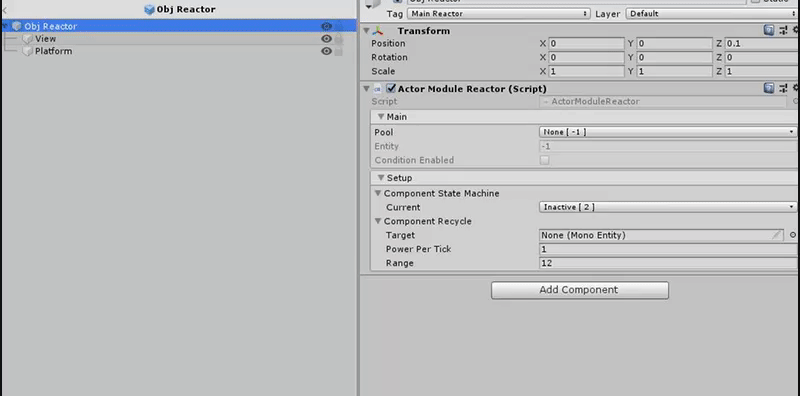-
Notifications
You must be signed in to change notification settings - Fork 77
Actor ( Deprecated )
The Actor is a bridge class that allows communicating between unity game objects and framework. Most of the time you will inherit from Actors when defining new objects.
The Actor class is NOT for defining game logic. It's for defining what is your Entity. You use Actors only to add some components to the Entity, to have a connection between Framework and Unity out of the box and for initial setup of the object.
- Inherit a new class from an Actor class. I recommend adding "Actor" word in the front of all your Actors scripts; this allows you to identify quickly in the project hierarchy all your actor classes.
public class ActorModuleReactor : Actor {- Add the
Setupmethod. TheSetupmethod is an essential part that allows safely initialize your actor on Awake and sync it in the right way with the framework. Please, use onlySetupmethod instead ofAwakeandStart.
public class ActorModuleReactor : Actor
{
protected override void Setup()
{
}
}- Now we are ready to add some components!
public class ActorModuleReactor : Actor
{
// use the FoldoutGroup attribute to decorate components nicely
// in groups in the Unity Inspector
[FoldoutGroup("Setup")]
public ComponentStateMachine componentStateMachine;
[FoldoutGroup("Setup")]
public ComponentRecycle componentRecycle;
protected override void Setup()
{
// add your components to the Entity of the Actor
Add(componentStateMachine);
Add(componentRecycle);
// add a component by its type.
Add<ComponentDescription>;
}
}At the next frame your Entity will be added to all processings.
In some situations, you might want to hold your Actor and decide when deploying your Entity to processing.
In this case, inherit your Actor from IManualDeploy interface.
public class ActorModuleReactor : Actor, IManualDeployFinally, once you are ready to ship your Actor entity use ForceDeploy() method with your Actor.
An Actor adds a ComponentObject by default. The ComponentObject holds the Transform reference of the Actor attached to the GameObject
- Actor checks if the scene initialized from the Starter class. If not it holds Enable and Setup methods until initialization; this helps to be sure that Starter class initialize all Processing and Framework scene related scripts first.
- Actor creates a new entity and add
ComponentObjectto it. - Setup method is triggered. All custom stuff and components developer wish to add goes to the Setup method.
- When an Actor enabled, Deploy method is triggered. The entity goes to all entity groups that are interested in this particular entity.
- When an Actor is disabled it notifies all entity groups that holds this particular entity that it's out.
- When an Actor destroyed, it notifies all entity groups that holds this particular entity that it's out and free the entity ID.
